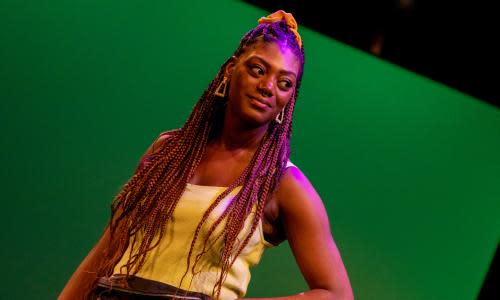Braids/Cheer Up Slug review – lively double bill mines young identity

What are the chances of the Durham miners’ gala making an appearance in two consecutive plays? That’s the case in this lively double bill by young north-east writers. On both occasions, the so-called Big Meeting challenges the identities of young characters as they struggle to define their place in the world.
For debut playwright Olivia Hannah in Braids (★★★☆☆), the annual event is particularly fraught. On the one hand, it is a vibrant expression of the working-class community to which Rochelle Goldie’s teenage Jasmine belongs. On the other, it is an almost exclusively white occasion.
As the daughter of a white mother and an absent black father, Jasmine has grown up in a white society and has overlooked the gala’s homogeneous face. But when she is joined by Xsara-Sheneille Pryce as Abeni, who grew up in a racially mixed Manchester, the under-representation becomes apparent. It’s hard for Jasmine to know which identity to claim.
Like the playwright, the actors in Kemi-Bo Jacobs’ production have a keen understanding of the push-and-pull tensions of teen friendship, here intensified by their contrasting experiences of racism and cultural identity. The play’s focus tends to drift, but at its best it raises awkward questions about how young black women can define themselves in a world that is only too quick to provide definitions for them.
The gala features again in Cheer Up Slug (★★★★☆) when David Fallon’s Will observes a party of posh Durham students sneering at the brass bands. The thought of going to university with such people horrifies him. Yet to study elsewhere would mean to reject his own culture.
But the real concern of playwright Tamsin Daisy Rees in this sparky and disturbing two-hander, directed by Anna Ryder, is less with Will than with Jackie Edwards’s Bean. She is a sharp-witted and idiosyncratic 16-year-old, emerging from a toxic relationship with an abusive boy only to find her long-time friend Will is scarcely more trustworthy.
The tone goes from comic to troubling, taking in bold strokes of muddy theatricality on the way, as Fallon and Edwards capture the ungainliness and exuberance of young people searching for definition with sometimes painful results.
Braids and Cheer Up Slug are at Live theatre, Newcastle, until 23 October.

